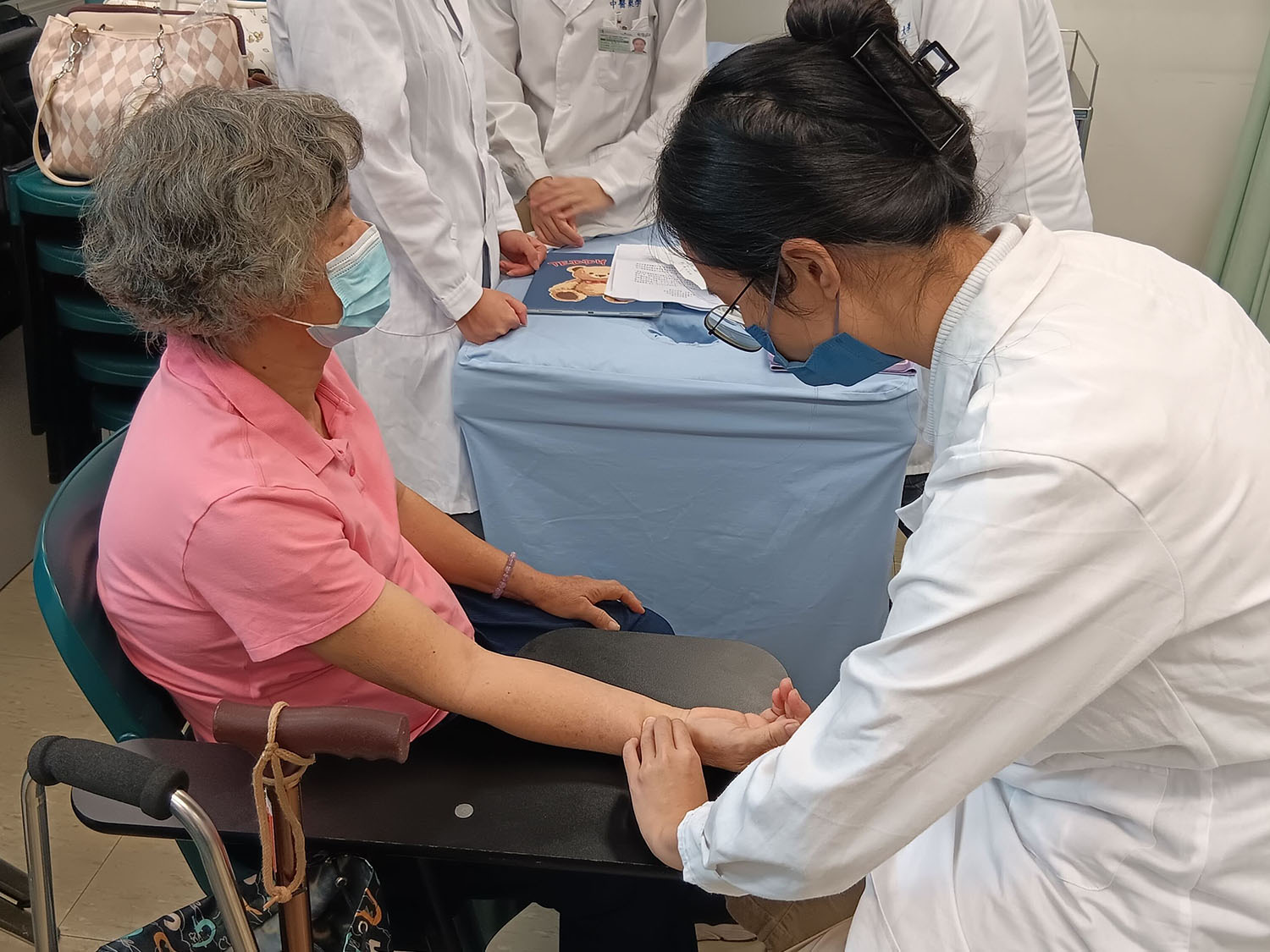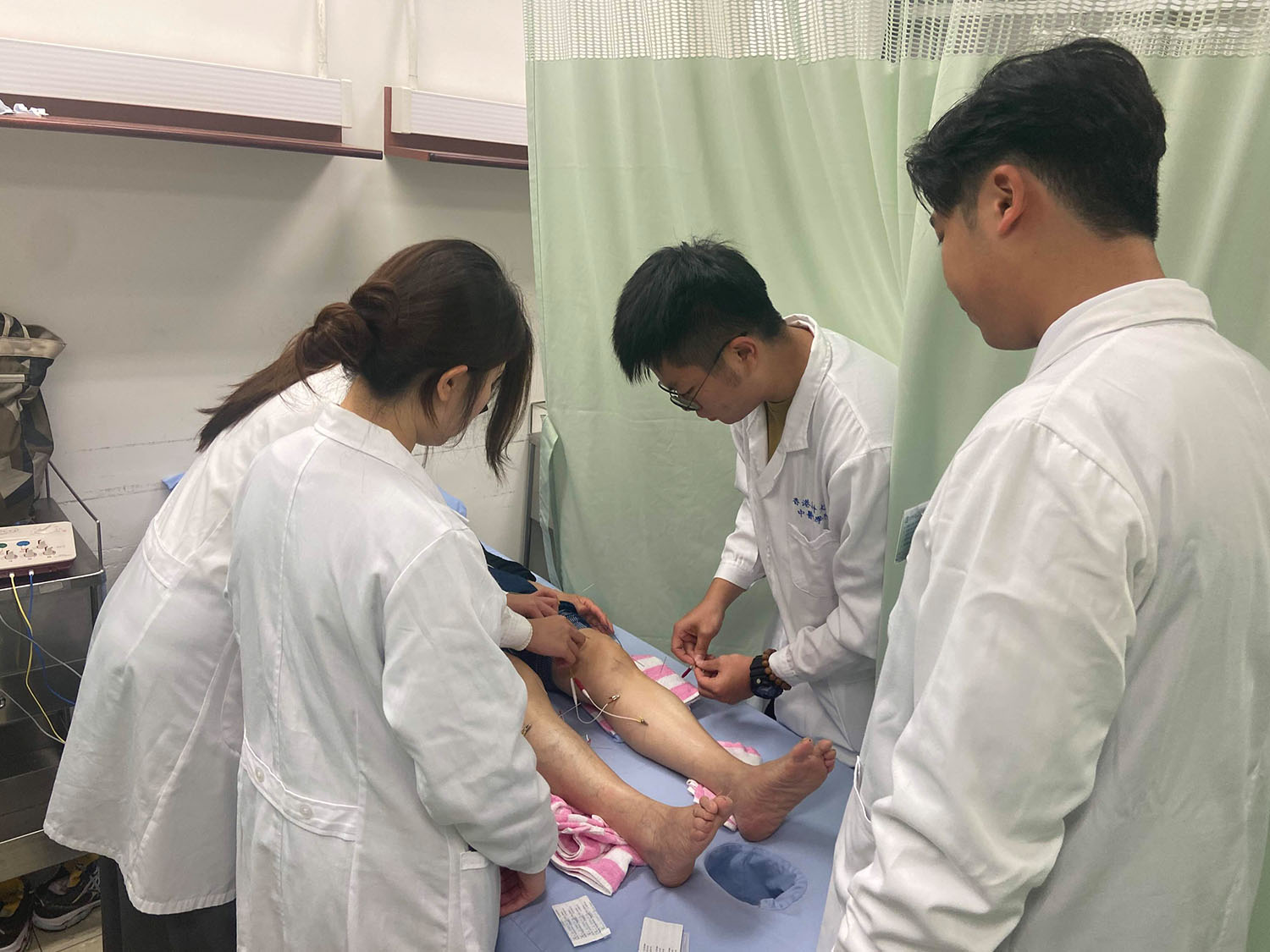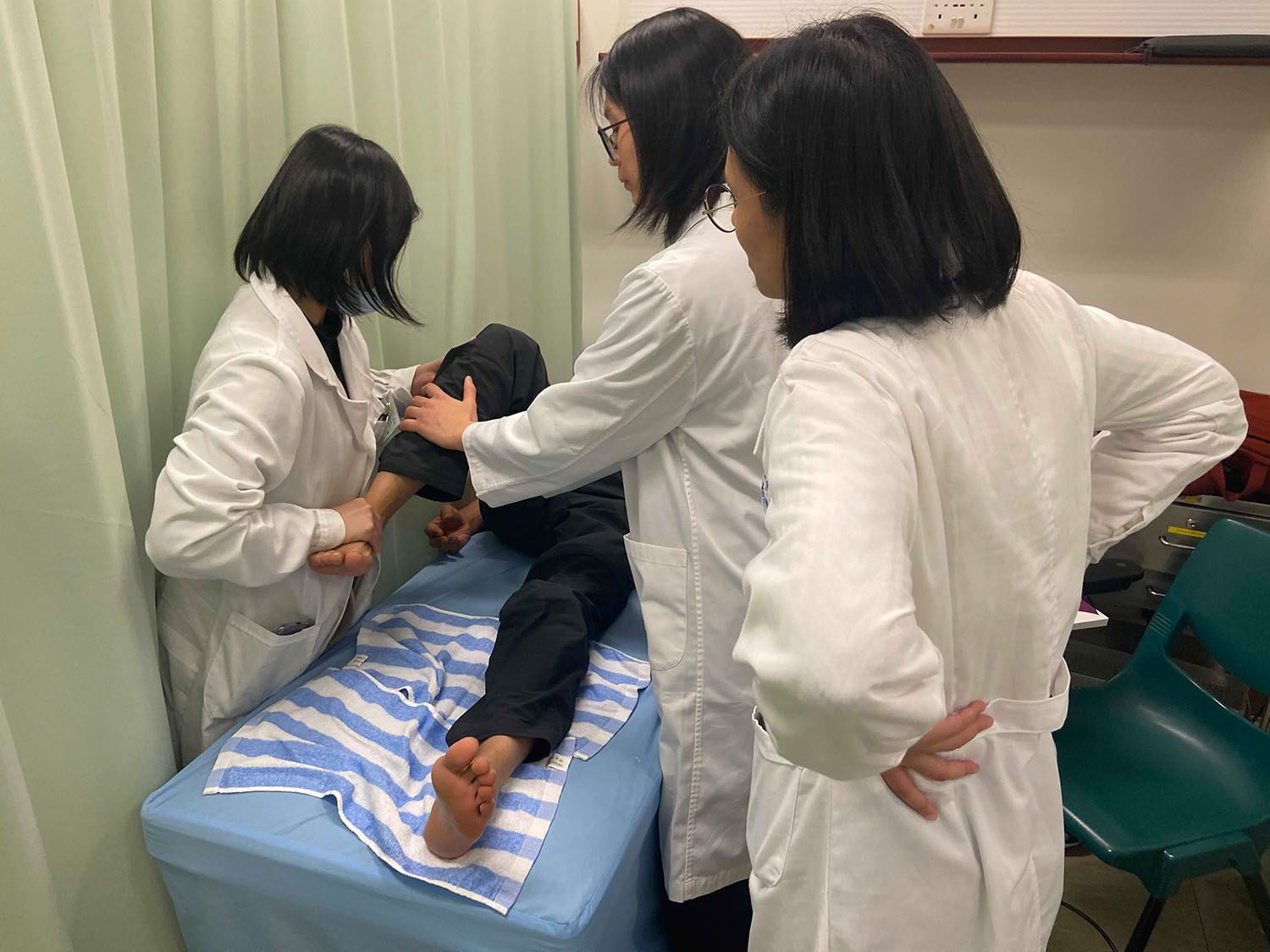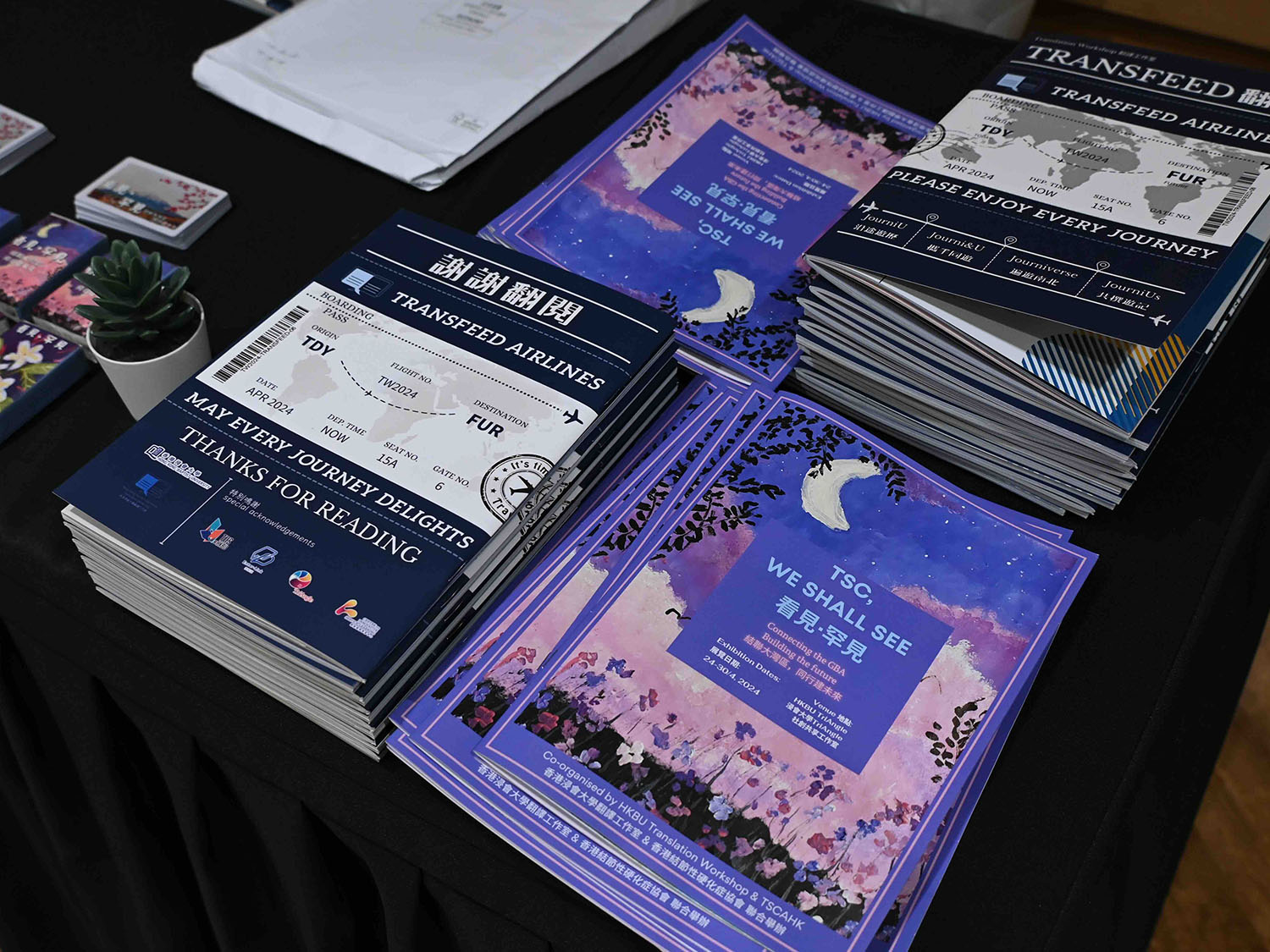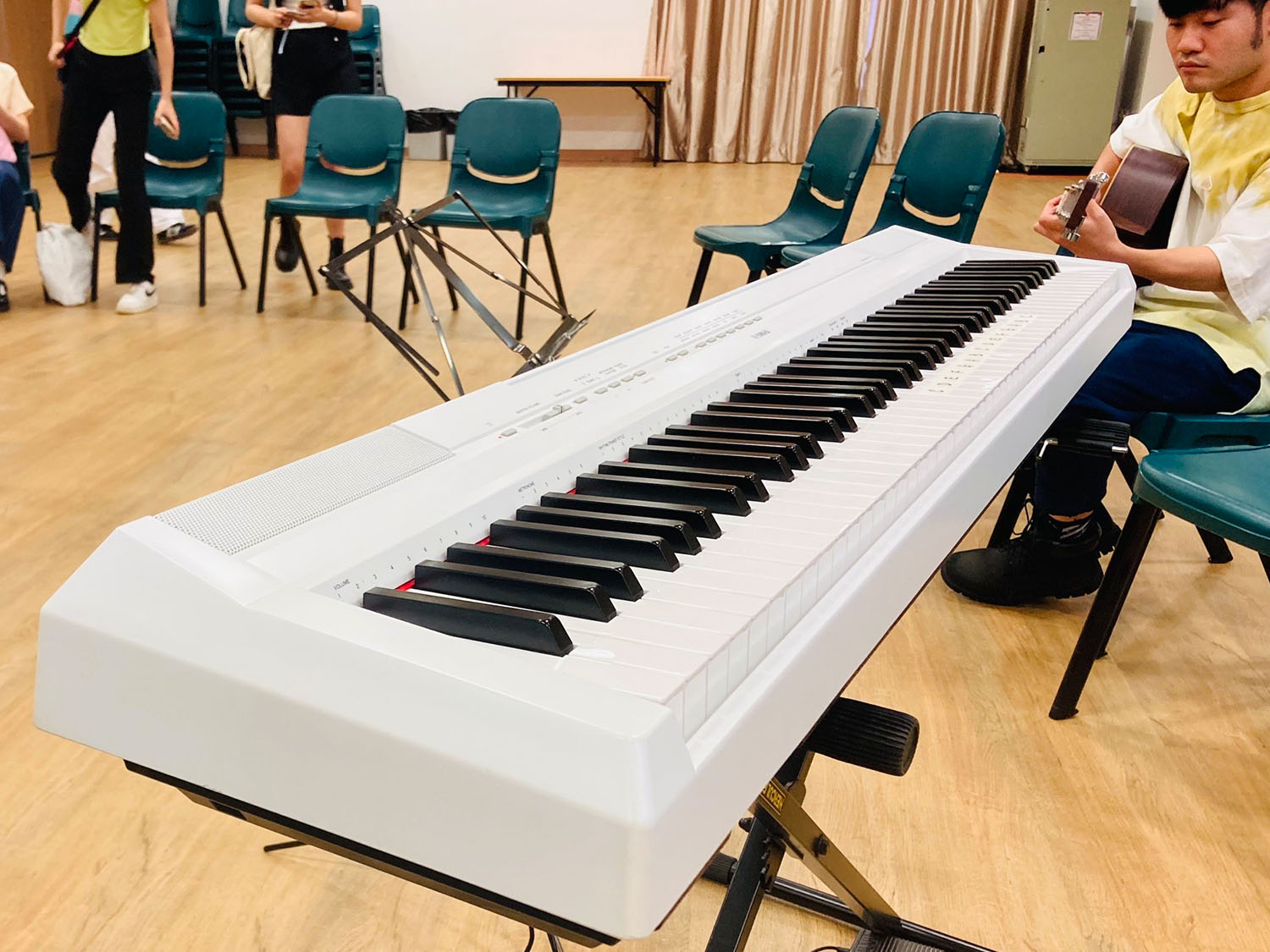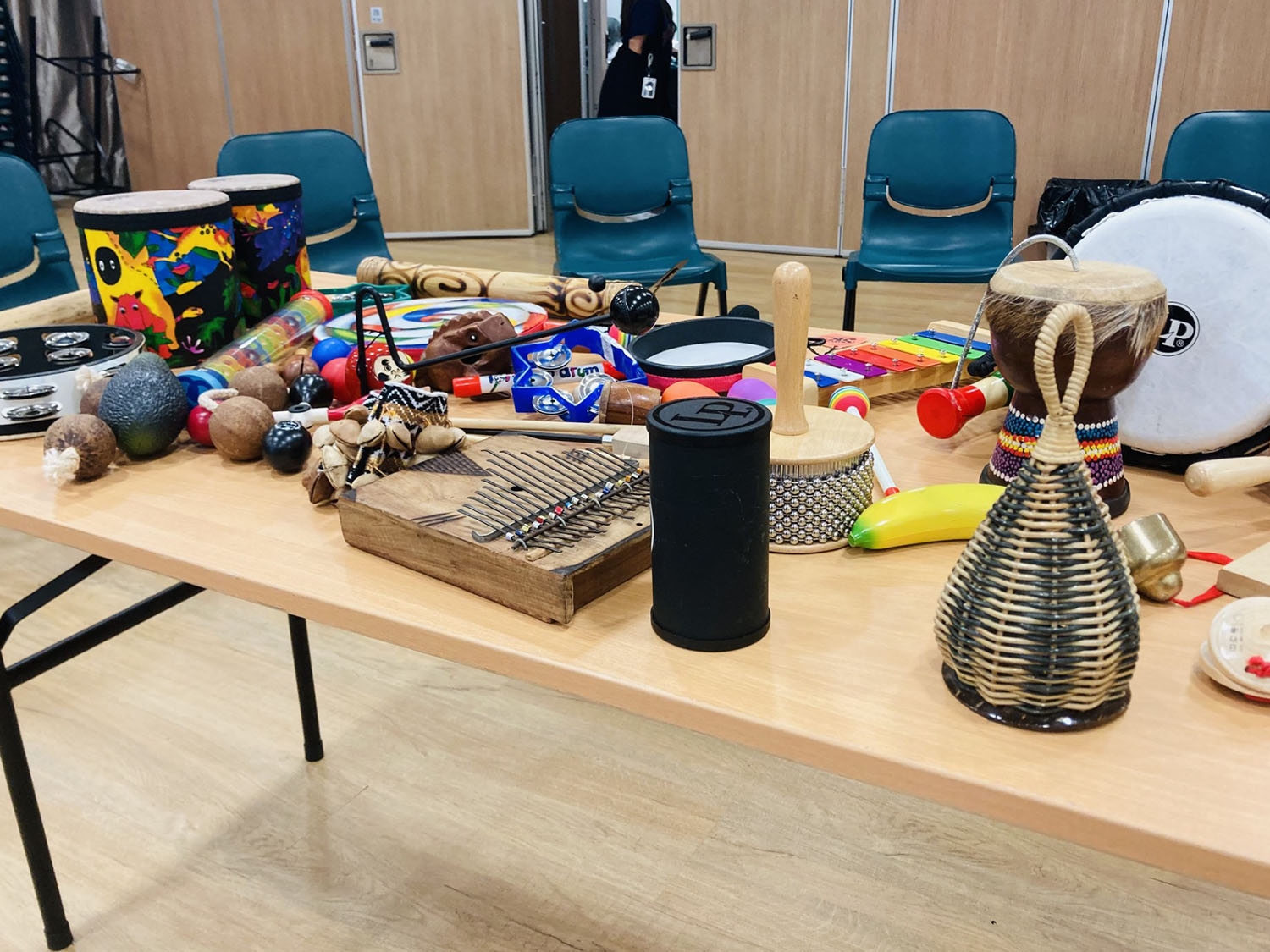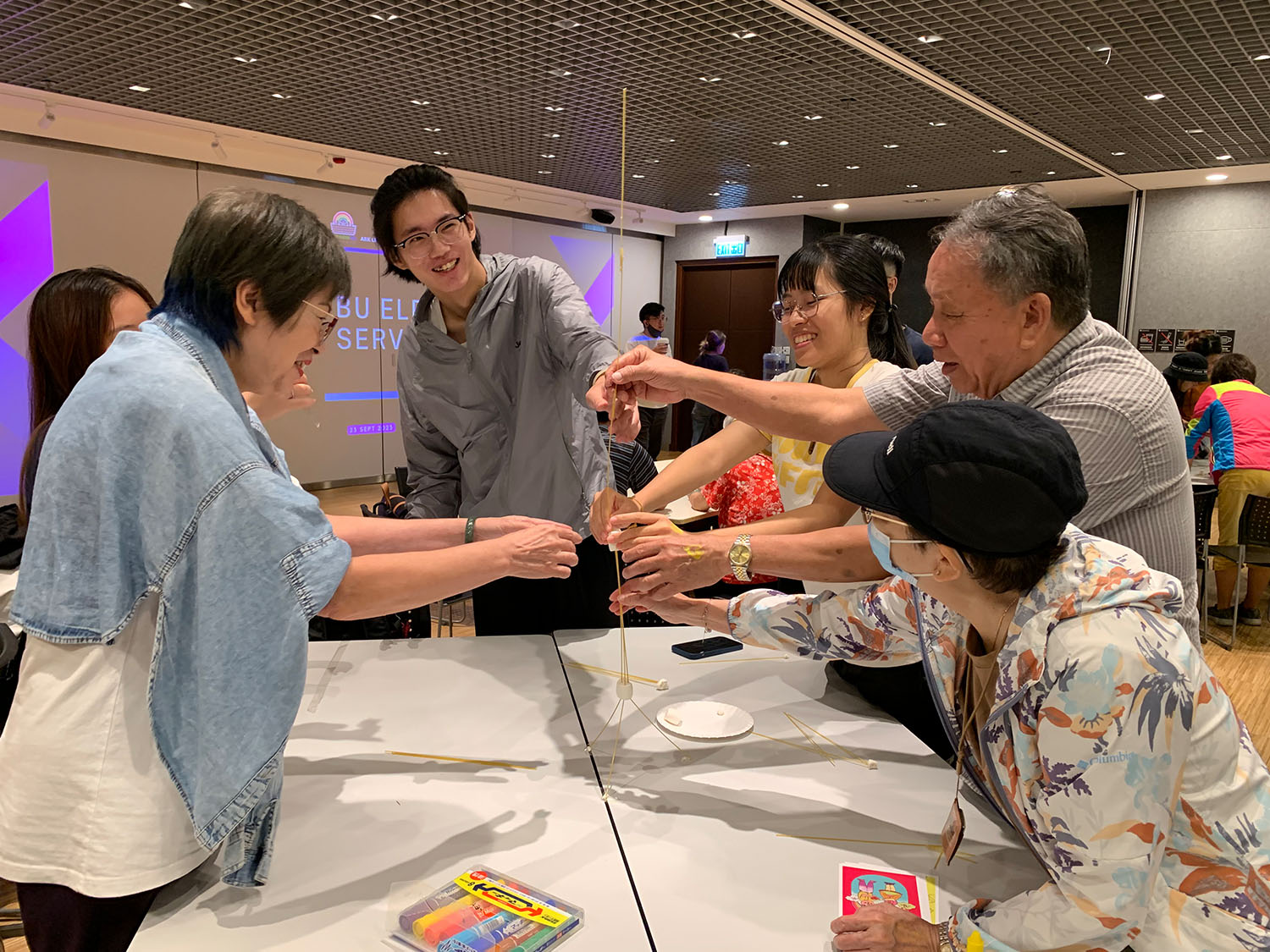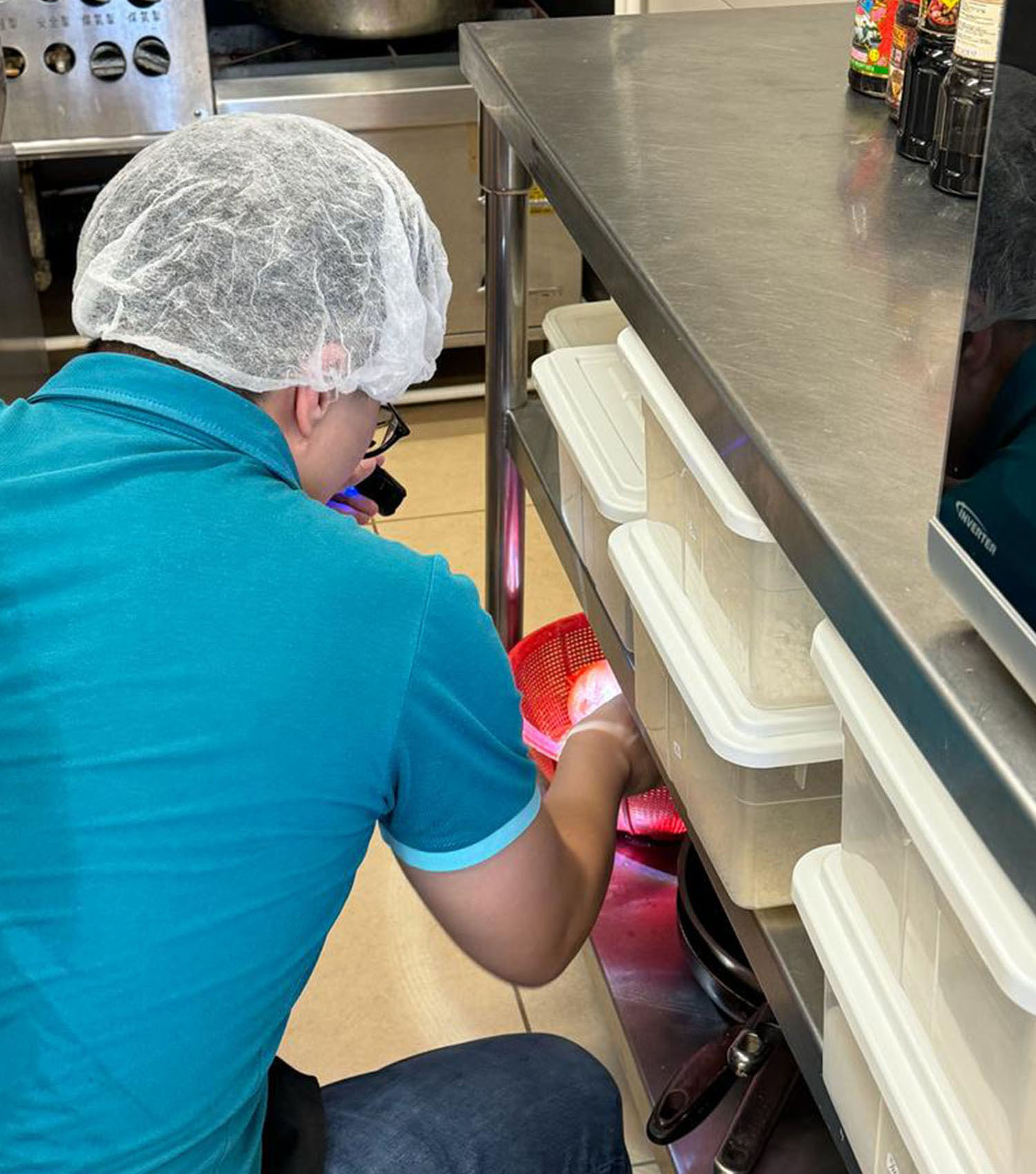SDG 03: Good Health and Well-Being
In the service-learning course "Orthopaedics and Traumatology of Chinese Medicine and Tui Na I/II", instructed by Mr Cheung Chun-hoi, students collaborated with the Hong Kong Society for Rehabilitation to assist patients with chronic pain. Applying their Traditional Chinese Medicine (TCM) orthopaedic knowledge, the students diagnosed and treated patients with acupuncture and manipulation techniques, significantly improving their quality of life by alleviating pain. This first-hand experience enhanced the students' clinical expertise and skills foundational to becoming future TCM practitioners and provided them with opportunities to promote healthy ageing among the elderly community.
Promoting inclusive societies through multilingual advocacy initiatives
"Translation Workshop", a service-learning course led by Professor Janice Pan, empowered students to set up a student translation company to advocate for Tuberous Sclerosis Complex (TSC), a rare disease in Hong Kong. Students applied their translation skills by creating multilingual content featured in the TransFeed publication and hosted a 7-day exhibition at HKBU’s social innovation co-working space TriAngle with over 300 visitors in partnership with the TSC Association of Hong Kong. The exhibition comprised a screening of the 3CM documentary on TSC patient struggles and a music recital by youth living TSC. Through these initiatives, students demonstrated their commitment to bridging language barriers, promoting inclusivity and equity, and advocating for important health-related causes.
Promoting well-being through the power of music
The "Destress through the Power of Music" workshop was organised by the Counselling and Development Centre. It offered students a blend of music-making activities, relaxation exercises, and group discussions. Throughout the session, 30 students engaged with an array of unique musical instruments, explored improvisation, and discovered how to harness music as a stress management tool by integrating music therapy techniques into their personal self-care practices. The collaborative nature of the workshop not only served as a creative outlet but also strengthened their sense of connection with others. The students reported that they had learned a great deal and enjoyed the opportunity.
Empowering health and wellness through service-learning
"The Path to Benevolence: Tin Ka Ping Foundation Service-Learning Showcase" highlighted the students’ learning journeys as they explored the intersection of Chinese culture and values with health and well-being through service-learning courses, including Traditional Chinese Medicine (TCM) and Computer Science.
Students from TCM courses provided health consultations and treatments, including acupressure and Tui Na for elderly individuals with chronic health challenges, demonstrating the importance of preventative and holistic care. In addition, students from the Computer Science course integrated human-centred design principles to design user interfaces that enable health information to be easily accessible on digital platforms for the elderly.
This exhibition showcased students’ achievements and reinforced the significance of whole-person education in advancing good health and well-being in our communities, promoting a healthier and more equitable society.
Promoting cross-generational integration and positive ageing
In the 2023–24 "Community Engagement Organisers: Positive Ageing Learners Programme", over 60 students and elderly volunteers partnered under the Leadership Qualities Centre of the Office of Student Affairs. They formed cross-generational buddy teams to assist over 130 elderly individuals in the Wong Tai Sin community. The programme aimed to promote positive ageing, offer elderly care, and facilitate intergenerational connections. The teams received training and provided services to frail elderly individuals, including regular visits, social activity accompaniment, and home improvements, resulting in over 80 completed home improvement projects. The programme empowered the elderly to reintegrate into society and improve their well-being.
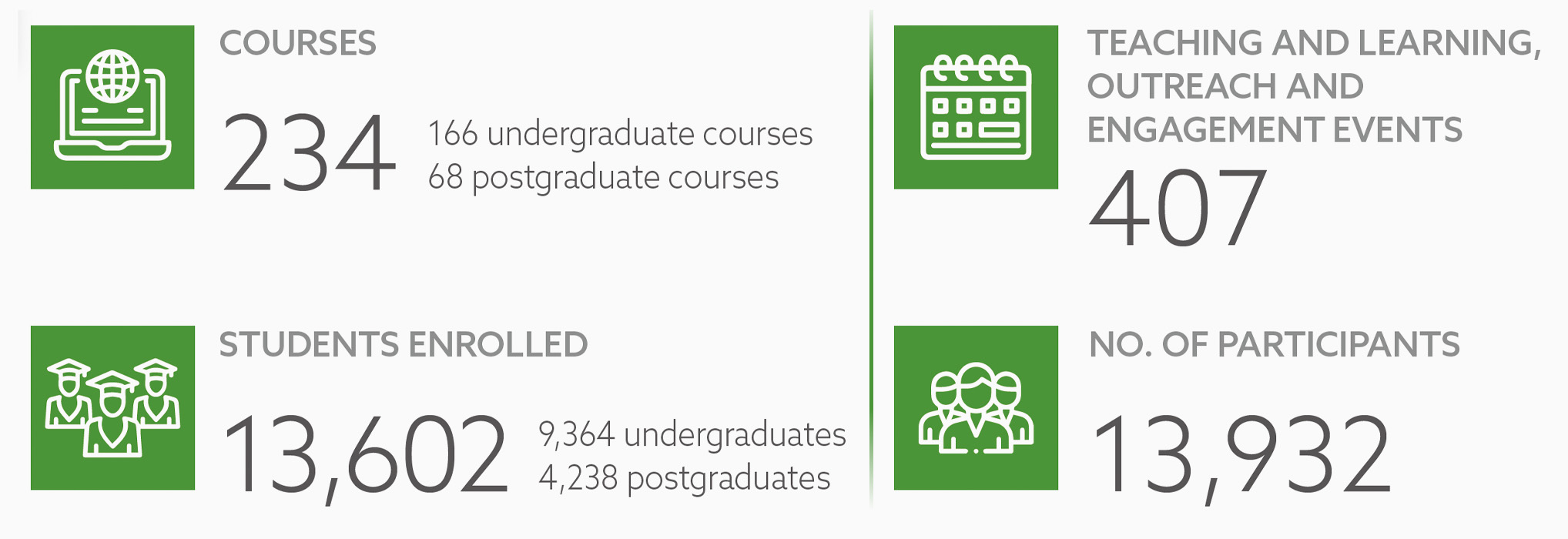

Academy of Music
Authors: Roberto ALONSO TRILLO*, Mariam GVINIASHVILI, Andrew QUINN
*Corresponding author
The Transcendence project leverages advanced sound and visual technologies to promote mental well-being. Through immersive 3D experiences, it elicits emotions like awe and wonder, which are key to psychological health. By designing ethereal, space-like environments, Transcendence demonstrates the positive effects of blending art and technology on mental wellness. This project emphasises the importance of creative experiences in supporting mental health, aligning with SDG 3’s commitment to holistic health for all ages.
PATNet: Propensity-adjusted temporal network for joint imputation and prediction using binary electronic health records with observation bias
Department of Computer Science
Authors: Kejing YIN*, Dong QIAN, William K. CHEUNG
*Corresponding author
This study presents a novel method to improve the robustness of data imputation and clinical predictions of electronic health records (EHRs), with the ultimate goal of facilitating good health and well-being. Most existing clinical prediction models ignore the inherent observation bias in binary medical data, compromising the reliabilities of the predictions. In this work, the team tackles this issue by explicitly modelling the patterns of missing data and their dependencies on patients, features, and time. To this end, the team develop a tailored neural network that estimates the propensity score and the imputation simultaneously. Additionally, a low-rank approximation is adopted to render the propensity score learnable. By accurately capturing missing patterns, one can mitigate observation bias by imputing the missing data, thereby improving the reliability and robustness of clinical predictions generated.
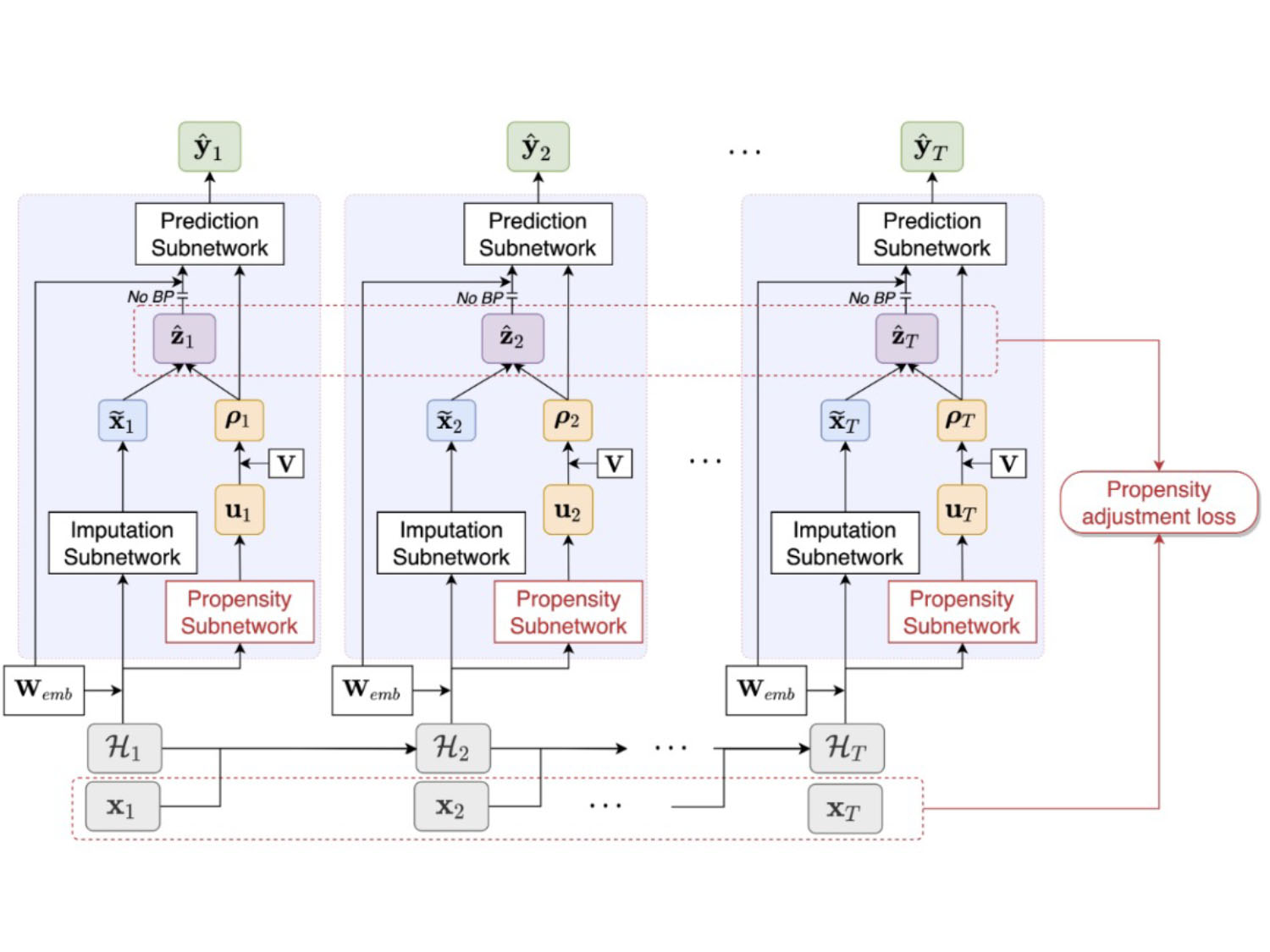

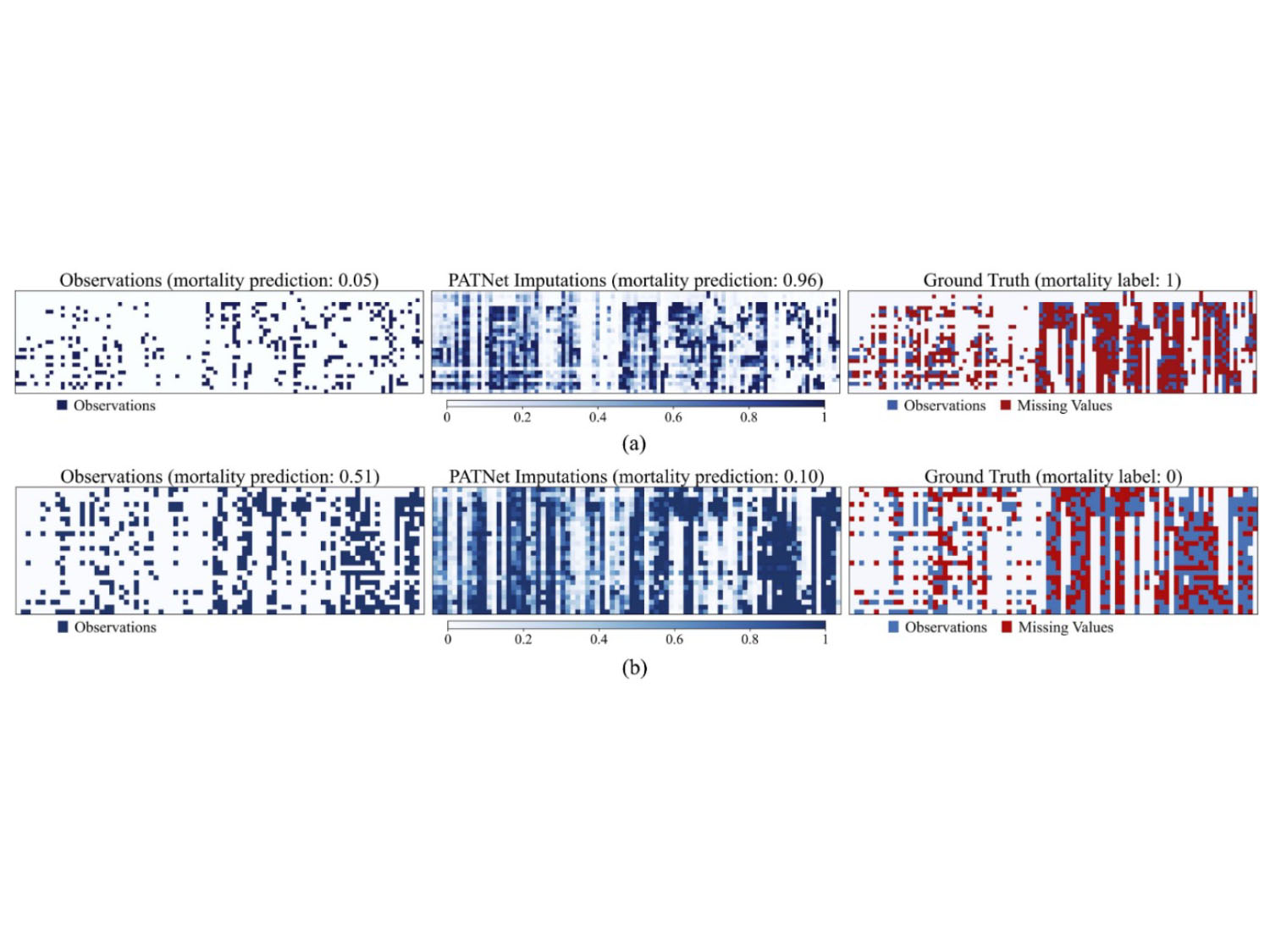

Chronic real-ambient PM2.5 exposure exacerbates cardiovascular risk via amplifying liver injury in mice fed with a high-fat and high-cholesterol diet
Department of Biology
Authors: Yi CHEN, Hiu Lok NGAN, Yuanyuan SONG, Zenghua QI, Lifang ZHAO, Chuan DONG, Ruijin LI, Yanbo LI, Zhu YANG*, Zongwei CAI*
*Corresponding author
PM2.5 poses significant health risks by penetrating deep into the bloodstream via inhalation, leading to systemic toxicity. Epidemiological studies link PM2.5 exposure to an increased risk of metabolic disorders, including cardiovascular diseases. These risks are exacerbated by high-fat, high-cholesterol diets (HFCD), which disrupt metabolic processes. The liver, central to lipid and cholesterol metabolism and detoxification, is crucial in this context. This study uses a real-world PM2.5 exposure system to explore how PM2.5 combined with HFCD affects cardiovascular health, particularly through mechanisms of liver damage. Key findings include the mechanisms by which PM2.5 exposure disrupted cholesterol homeostasis and high-density lipoprotein (HDL) production in the liver of mice on an HFCD diet, leading to elevated levels of non-HDL cholesterol in the blood. Also, PM2.5 exposure stimulated the oxidation of low-density lipoprotein (LDL) in the circulation system, thereby hindering the liver's clearance of oxidised LDL, thereby the oxidative stress in the liver.
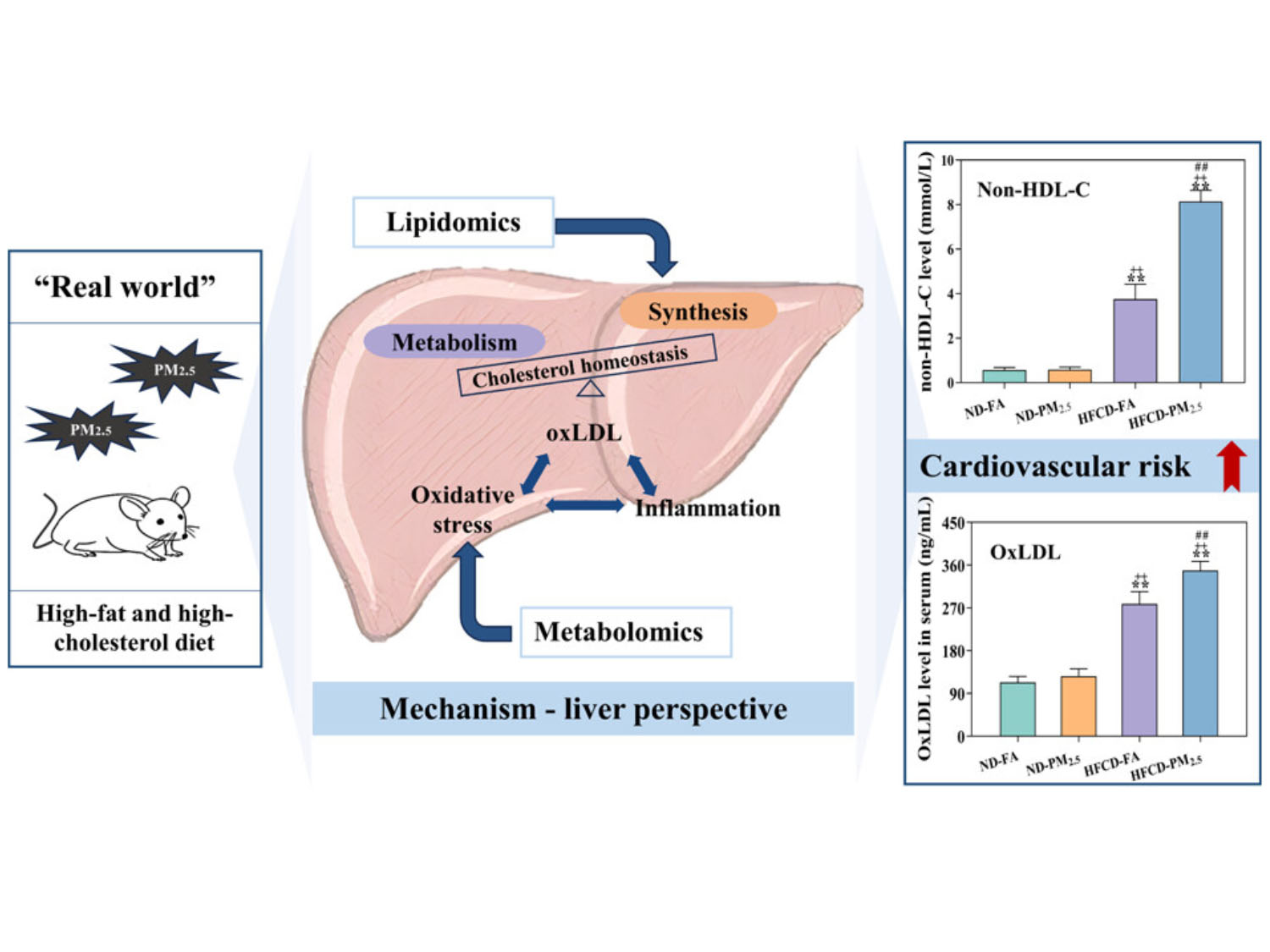

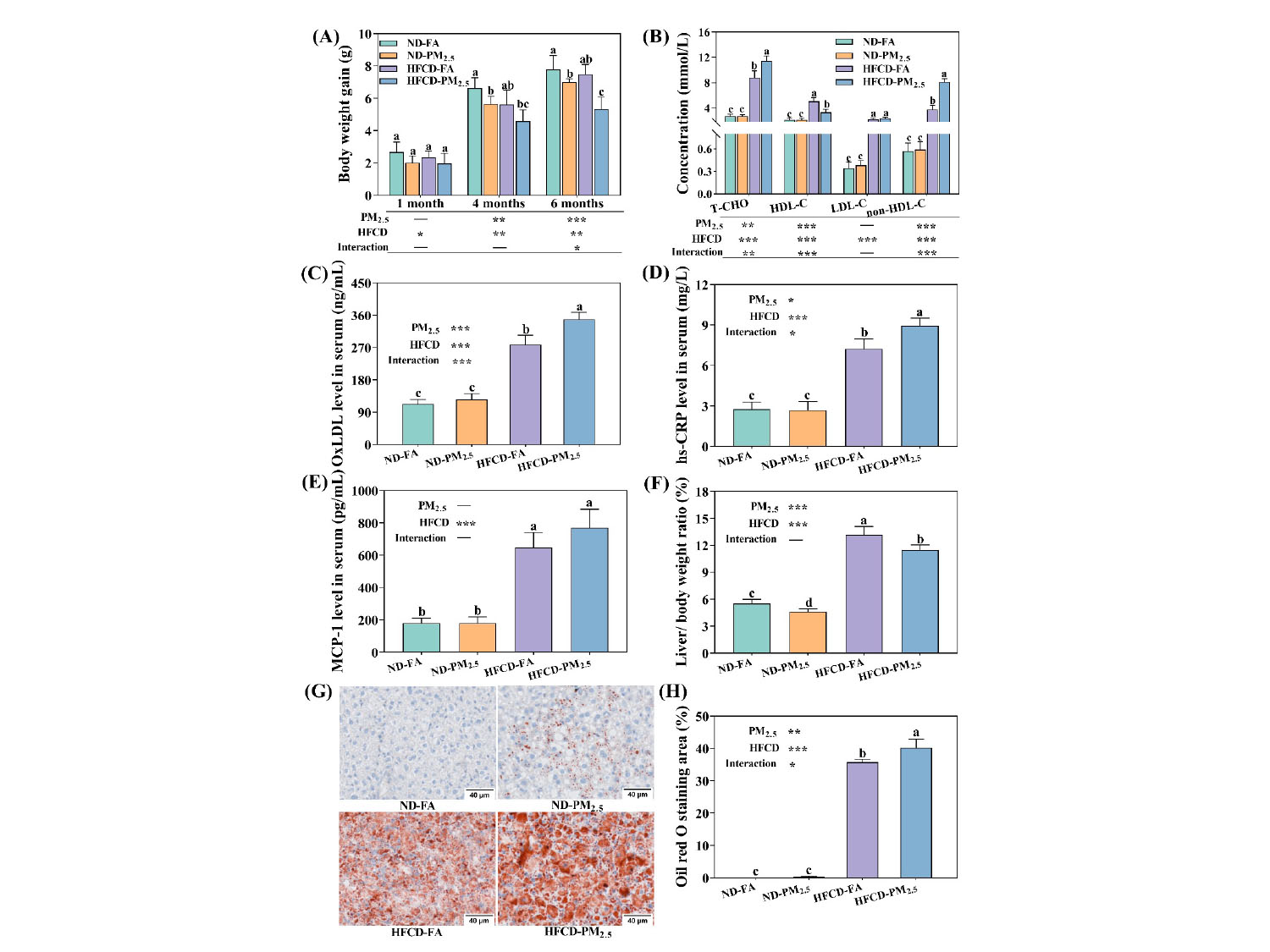

Intracellular sclerostin plays a vital role in tumour progression and metastasis in triple-negative breast cancer
School of Chinese Medicine
Authors: Meiheng SUN, Shuangying QIAO, Hang LUO, Xin YANG, Liu YANG, Huarui ZHANG, Zefeng CHEN, Luyao WANG*, Xiaohui TAO, Yuanyuan YU*, Fenglai, YUAN*, Daqing MA*, Qianjun CHEN*, Aiping LYU*, Bao-ting ZHANG*, Yuan MA*, Fangfei LI*, Ge ZHANG*
*Corresponding author
There is an urgent need to identify promising targets for triple-negative breast cancer (TNBC) patients. In the TNBC xenograft and syngeneic models that saw the loss of sclerostin, the tumour progression/metastasis almost halted. Neither recombinant sclerostin protein nor sclerostin antibody had any effects in TNBC cells and mouse models, suggesting that the role of extracellular and systemic sclerostin could be excluded. Genetically, a transgenic TNBC cell line only producing non-secreted intracellular sclerostin induced significant acceleration of TNBC progression/metastasis. Pharmacologically, the team designed an aptamer-based PROTAC with excellent intracellular sclerostin degradation activity, which induced significant TNBC inhibition in vitro and in vivo. Furthermore, it was uncovered that the interaction between intracellular sclerostin and caprin-1 was essential for intracellular sclerostin to drive TNBC progression/metastasis. This study uncovered an unrecognised role of intracellular sclerostin in TNBC development and proposed a viable intracellular sclerostin degrader strategy (aptamer-based PROTAC), which contributed to the health and well-being in line with SDG 3.
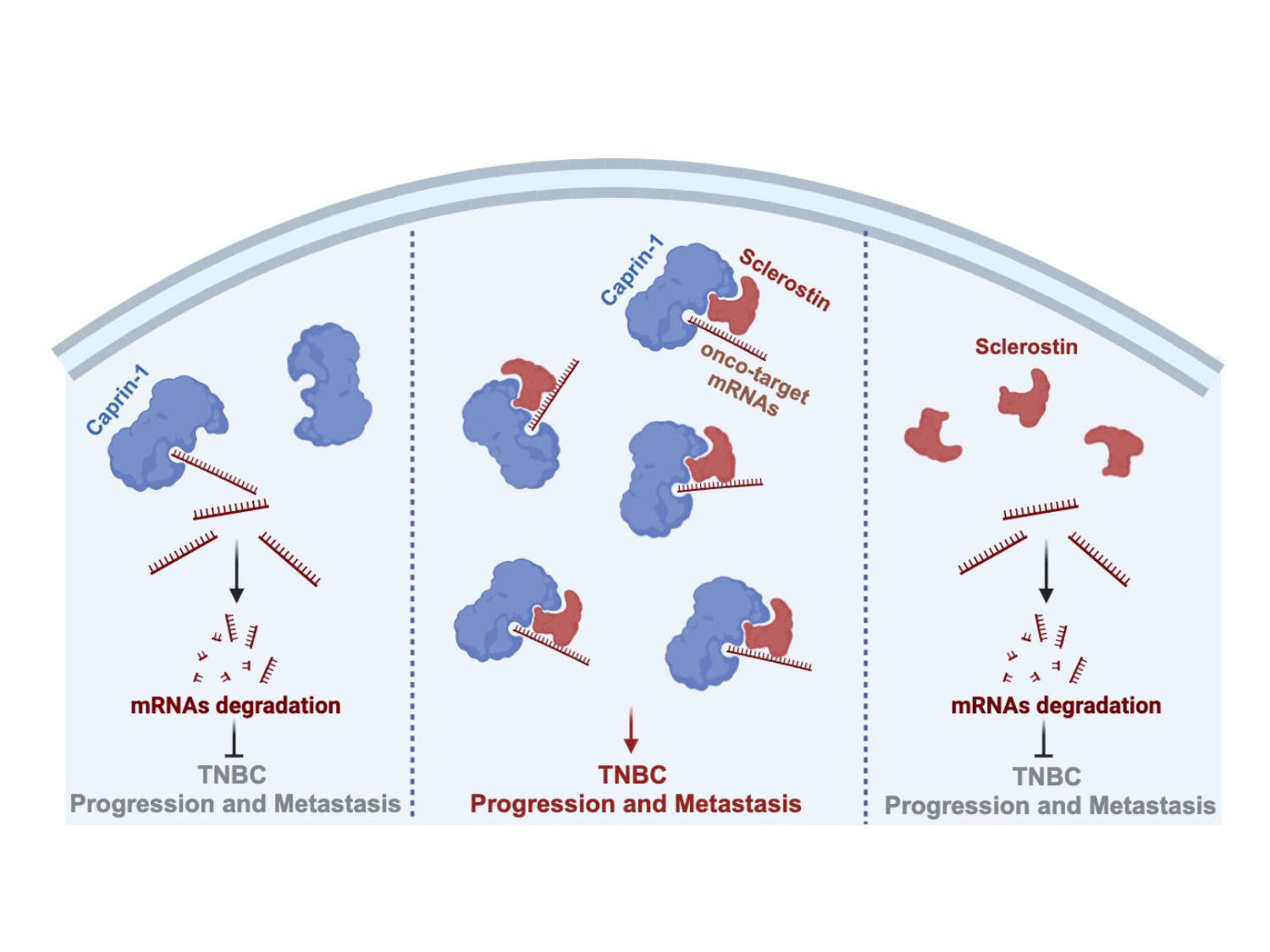

Sea bass (Lateolabrax maculatus) exerts anti-ulcerative colitis effects through gut microbiota modulation
School of Chinese Medicine
Authors: Jiali CHEN, Yuhang XIAO, Kejian WANG, Xiuqiong FU, Yueyao FAN, Muhammad Jahangir HOSSEN, Yingjie CHEN, Weibin BAI, Zhiling YU*, Baojun XU*
*Corresponding author
Sea bass (Lateolabrax maculatus) is more than just a tasty fish; it has therapeutic benefits for inflammation-linked conditions. Studies have demonstrated that sea bass can ameliorate ulcerative colitis (UC), an inflammatory bowel disease (IBD), by inhibiting TLR4 signalling pathway. An imbalance of gut microbiome can promote IBD progression. This research reveals that sea bass has the ability to rebalance the gut bacteria in UC mice. An increase in a particular beneficial bacterium, Christensenella minuta, could be a sign that sea bass is effectively improving the gut environment in UC. This study provides additional pharmacological justifications for eating sea bass to control UC, contributing to better health and well-being in line with SDG 3.
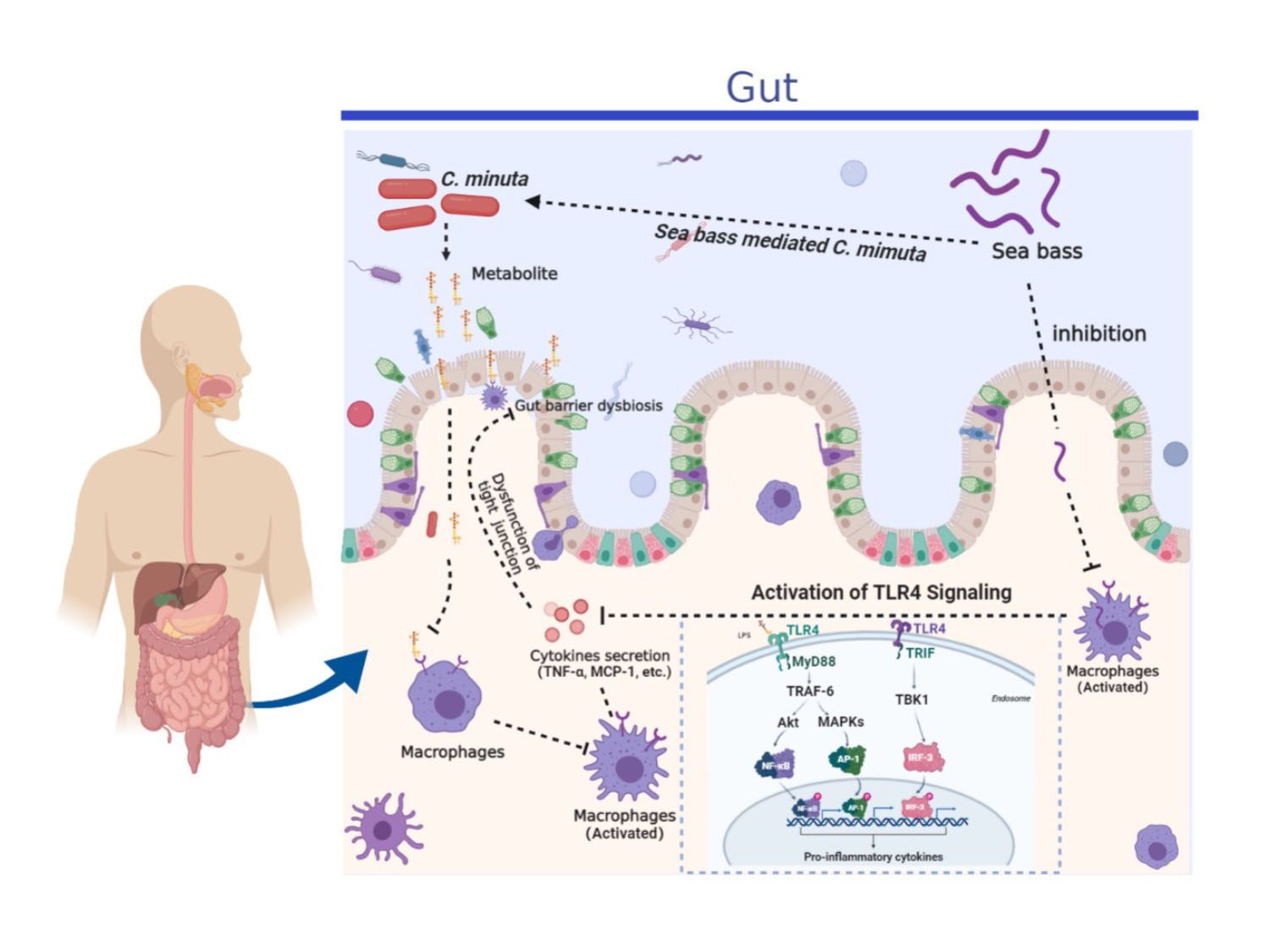

The University provides comprehensive healthcare services to support the well-being of its students, staff, and their families. Through a holistic approach, the University prioritises both physical and mental health within the campus community.
On the physical front, the University offers quality on-campus medical services at the Health Services Centre, which is run by an appointed medical group and provides a range of services, including routine check-ups, consultations, and treatment for minor illnesses or injuries. To further extend accessible and affordable healthcare options, the University also collaborates with off-campus dental service providers to offer discounted rates for the University community. Recognising the benefits of integrating both Western and traditional Chinese medicine practices, the University operates its own School of Chinese Medicine clinics, both on and off campus, which provide discounted Chinese medicine clinical services to students, eligible staff, and their family members.
In addition to promoting physical well-being, the University places a strong emphasis on mental health support. The Counselling and Development Centre offers free and confidential counselling services for eligible students, as well as consultation and referral services for staff. A team of dedicated counsellors is available to assist students who may be experiencing emotional distress, or any other concerns related to their well-being.
Health promotion and outreach
The University's proactive approach to healthcare extends to various health promotion and outreach programmes.
The annual Medical Clinic Welcoming Programme provides first-year students with complimentary vital health assessments, including measurements of height, weight, blood pressure, and pulse, as well as examinations for colour vision, visual acuity, and a review of health questionnaires. This comprehensive screening helps to identify any potential health concerns early on.
Recognising the importance of sexual and reproductive healthcare, the University regularly hosts seminars and webinars featuring healthcare experts. For example, in September 2023, a session titled "What We Need to Know about HPV Prevention" was conducted for the student community.
Committed to promoting mental health, in October and November 2023, HKBU launched the "MENsday@HKBU" campaign to raise awareness about mental wellness and the importance of stress release, with a focus on male colleagues. The campaign attracted around 800 participants. Additionally, the University organised a series of workshops and activities on mental health, mindfulness, and stress release. Between November 2023 and April 2024, five classes of "Mental Health First Aid Standard Course" were offered, both in online and face-to-face formats. The course was taught by instructors from Mental Health Association of Hong Kong and Counselling and Development Centre of the Office of Student Affairs, and designed to deepen staff's understanding of mental health and equip them with the knowledge to support those in need.
To maintain workplace well-being, the University has participated in the Joyful@Healthy Workplace Charter, organised by the Department of Health and Occupational Safety and Health Council, to emphasise the importance of having a joyful and healthy workforce and promoting physical and mental well-being among staff members.
HKBU has also collaborated with local, national, or global health institutions to improve health and well-being outcomes. Throughout the year, the University collaborates with local medical institutions to offer discounted human papillomavirus and seasonal influenza vaccinations to eligible students, staff, and their family members. Additionally, information sessions were organised to promote overall physical and mental well-being. For example, a seminar on eye care, was jointly organised by the University and Eye Fund, a local non-profit making charitable organisation, to deepen the understanding of common eye diseases and promote office eye care tips.
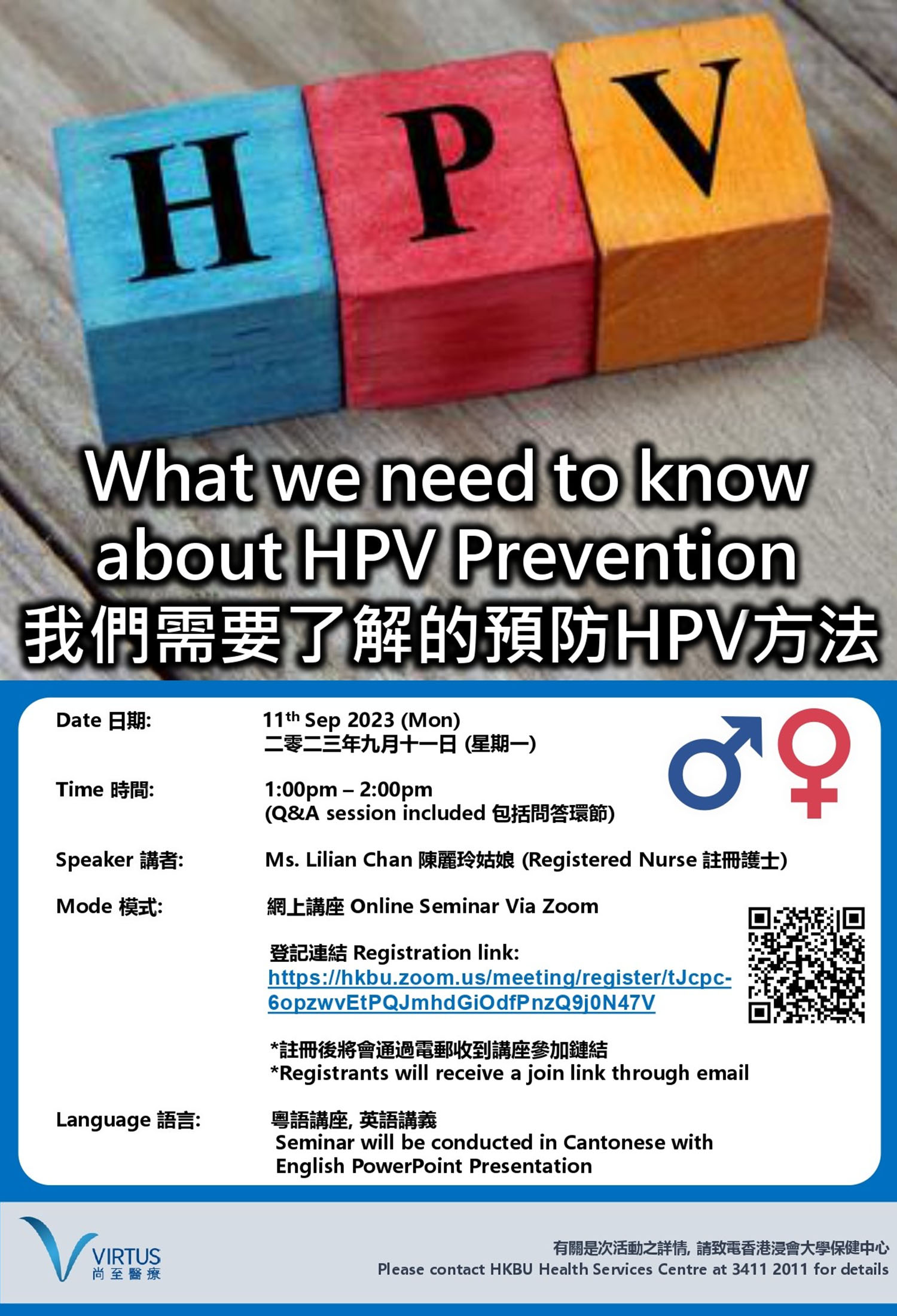

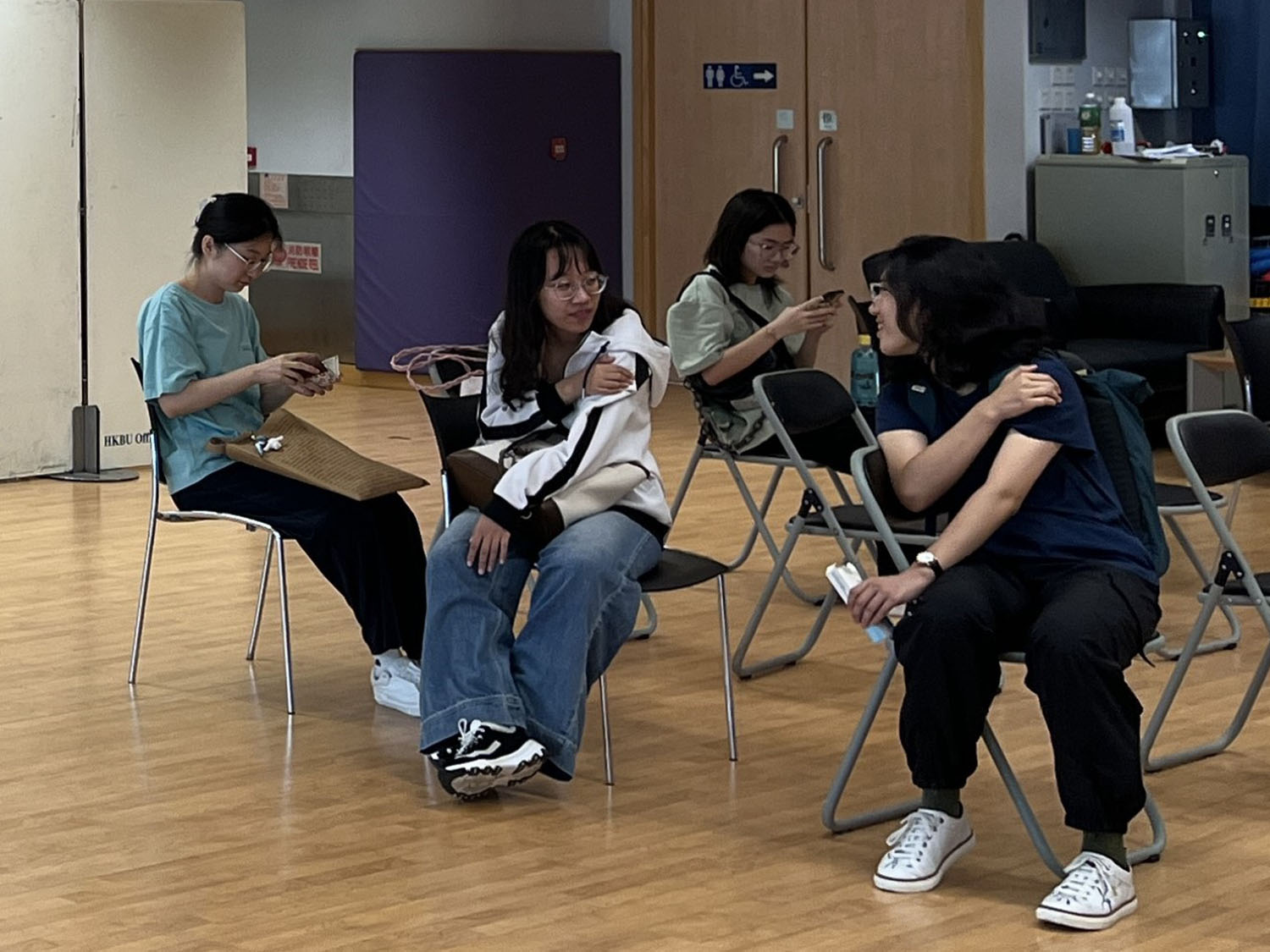

Provision of Chinese medicine healthcare services to the public
HKBU has long been committed to providing exemplary Chinese medicine clinical services to the public. By leveraging its specialised expertise, the University offers holistic treatments that address both physical and mental aspects of health.
Since 1999, the University has delivered a full range of quality Chinese medicine healthcare through the efforts of the School of Chinese Medicine. This includes operating an extensive network of nine self-run and seven jointly operated clinics, which have served over 3.5 million patients across Hong Kong. To enhance accessibility and affordability, the University implements initiatives such as discounted services for the elderly, credit card holders, and those under social assistance schemes.
Beyond direct healthcare, the University promotes public education through free consultations, body constitution tests, and regular seminars. The clinics also serve as platforms for Chinese medicine student training and academic research to advance evidence-based practices.
Establishment of the Chinese Medicine Hospital
As the contractor of the first Chinese Medicine Hospital (CMH) in Hong Kong, HKBU is committed to promoting the standardisation and internationalisation of Chinese medicine, while incorporating sustainability into its medical service provisions and daily operations.
Planned to commence operation in phases from the end of 2025, the CMH will be an integral part of Hong Kong’s healthcare system. It will provide a range of primary, secondary, and tertiary care services, with a focus on developing specialised Chinese medicine offerings. The CMH will identify specific priority disease areas for strategic development, considering the medical needs of Hong Kong population, the unique strengths of Chinese medicine, as well as the availability of talents and collaborative support from other institutions.
Through evidence-based clinical research on Chinese medicine, development research in Chinese medicine theories, and clinical applications of proprietary Chinese medicines, the CMH will promote the health benefits and values of Chinese medicine to the public. This will involve deepening understanding, encouraging the integration of Chinese medicine into daily living, and facilitating access to these services to support overall well-being.
The CMH will serve as a platform to facilitate service development, patient flow, knowledge flow, and talent cultivation, as well as enhance partnership and collaboration in service delivery, training, education, and research.
Shared sports facilities and community wellness
The University offers a diverse array of excellent sports facilities and recreational experiences for its students, staff and other members of the University community. The facilities include dedicated dance and table tennis rooms, a fully-equipped fitness centre, squash courts, an outdoor swimming pool, tennis courts, and multi-purpose halls that can accommodate activities like badminton, basketball, and volleyball.


The University also extends the privilege for staff and students to invite guests from the public to enjoy these facilities during their visits. This inclusive approach helps break down barriers and enables community members to benefit from the physical, mental, and social advantages of sports and exercise.
In the 2023-24 academic year, the Joint Sports Centre and the Wai Hang Sports Centre further demonstrated the University's commitment to community wellness. They opened their facilities to host athletic meets and competitions for local schools and district sports associations, contributing to the sustainability and vibrancy of the wider community.
The Joint Sports Centre has shared its facilities with external parties for the following events in the year 2023-24:
| Event | Organisation | Number of Days |
| Annual Athletic Meet | Alliance Primary School | 1 |
| Annual Athletic Meet | The University Sports Federation of Hong Kong, China | 2 |
| Tennis Competition | The University Sports Federation of Hong Kong, China | 2 |
| Handball Competition | The University Sports Federation of Hong Kong, China | 4 |
| Soccer Competition | The University Sports Federation of Hong Kong, China | 10 |
The Wai Hang Sports Centre has shared its facilities with external parties for the following events in the year 2023-24:
| Event | Organisation | Number of Days |
| Badminton Practice | International University Sports Federation (FISU) | 1 |
| Hong Kong 2023 International Collegiate Fencing Invitational | Absolute Development & Exchange Foundation | 3 |
| Inter-collegiate Basketball Competition | The University Sports Federation of Hong Kong | 10 |
| Basketball Competition | Kowloon City District Recreation and Sports Council | 5 |
| Sport Day | SAHK | 1 |
| Taekwondo Competition | SAHK | 1 |
| Hong Kong Universities Dodgeball Competition | Hong Kong Dodgeball Association | 2 |
| Table Tennis Tournament | Hong Kong Medical Association | 2 |
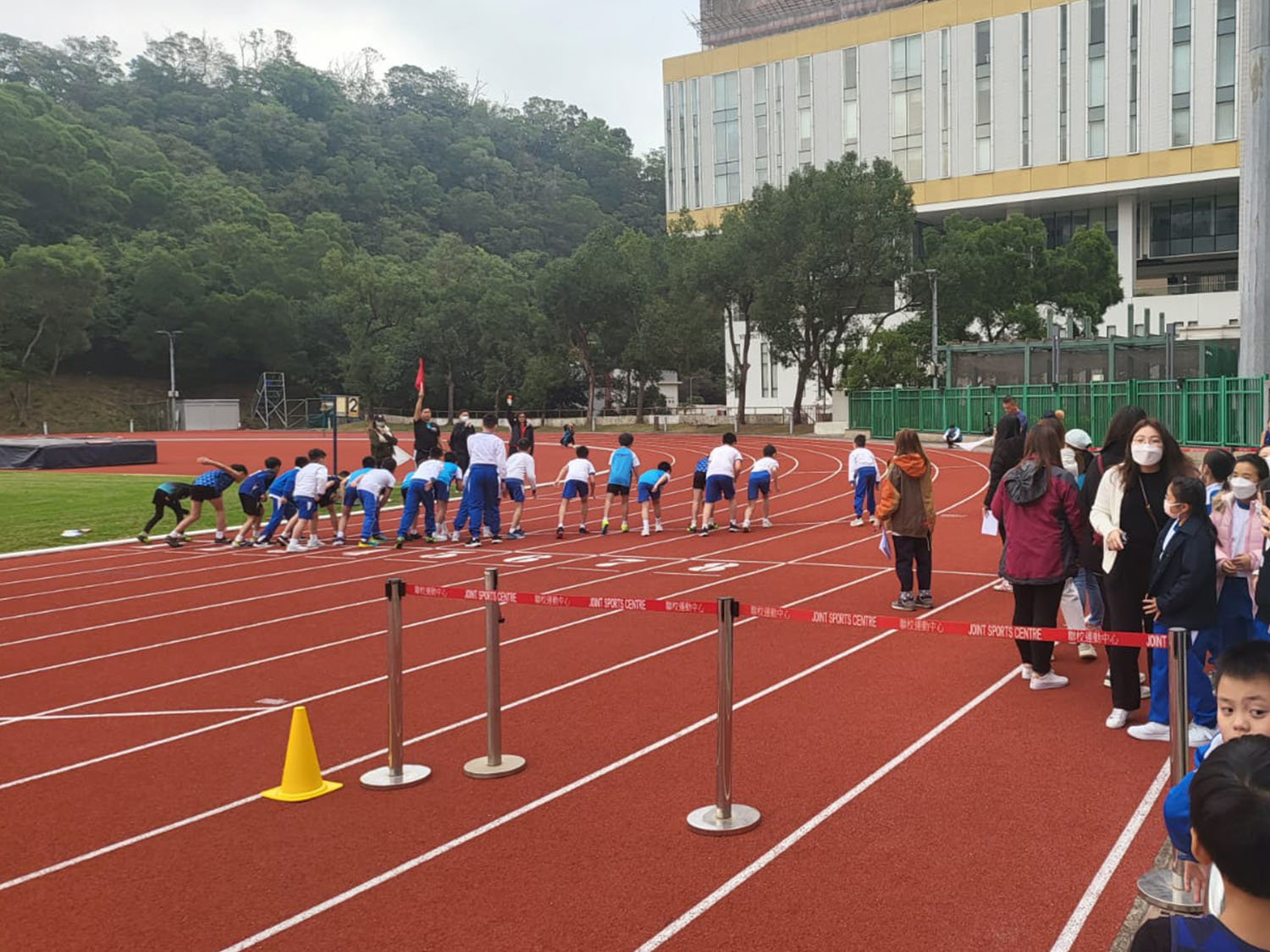

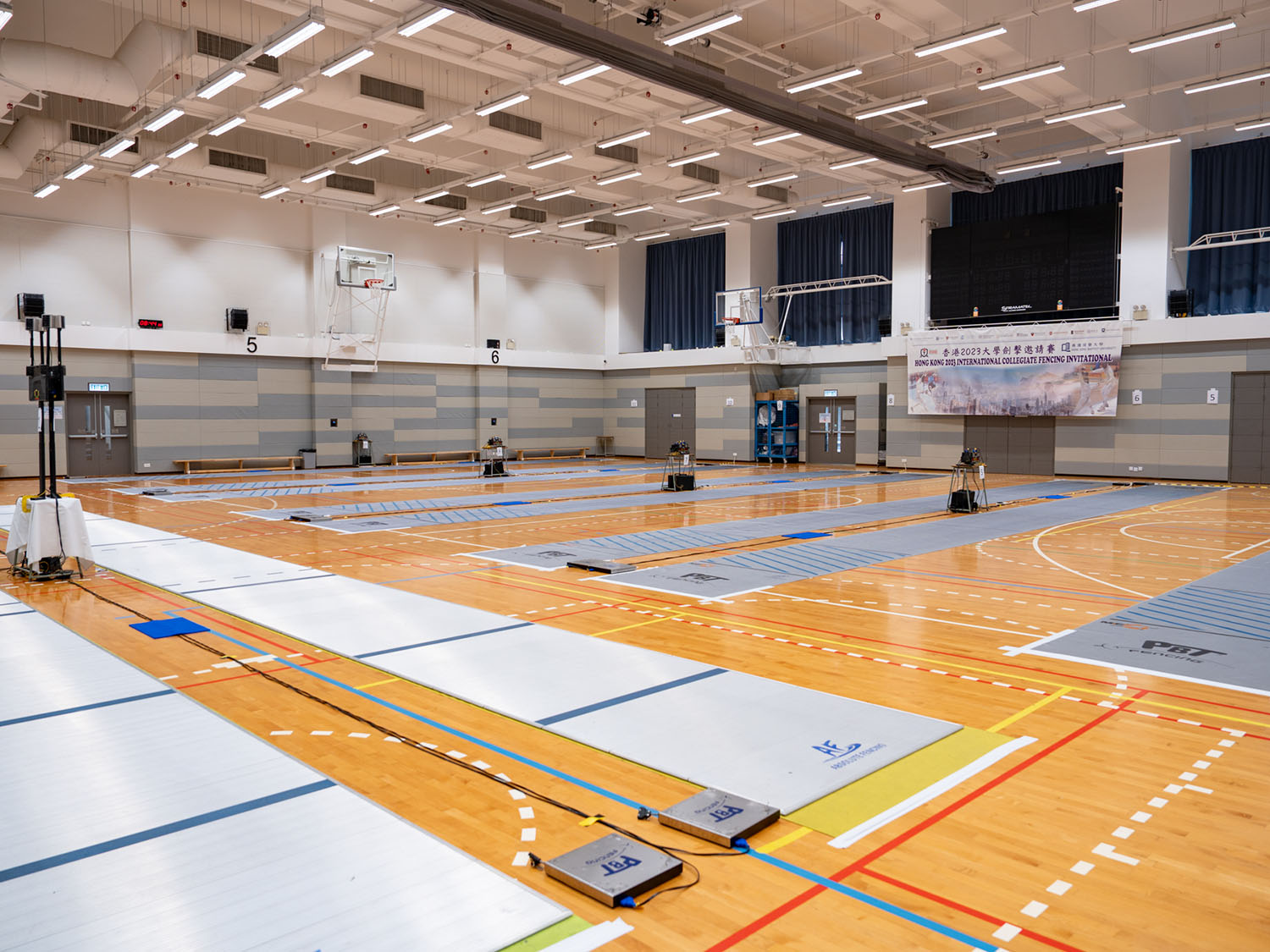

Smokefree campus
Acknowledging the significant health risks and harms posed by direct, second-hand, and third-hand smoke exposure, HKBU has instituted a comprehensive Smokefree Policy across all areas of the campus. This policy strictly prohibits smoking in both indoor and outdoor spaces within the University premises, applying to all members of the campus community. Beyond the enforcement of this policy, the University actively promotes and supports efforts to help individuals quit smoking.
Fostering campus health and safety
To safeguard the well-being of the University community, a comprehensive set of policies and programmes are regularly implemented and executed to the highest professional standards. These initiatives encompass regular inspections, testing, and surveys to robust health and safety measures.
One key example is the University's annual comprehensive survey of indoor air quality across the entire campus. In the latest assessment, a total of around 340 samples were tested, with each one achieving either an "excellent" or "good" class rating in accordance with the Indoor Air Quality Certification Scheme established by the Environmental Protection Department.
Additionally, the University conducts regular food safety audits to manage the overall hygiene conditions, and address the potential hazards of food safety in a systematic and responsible manner at all catering outlets located within the campus.
